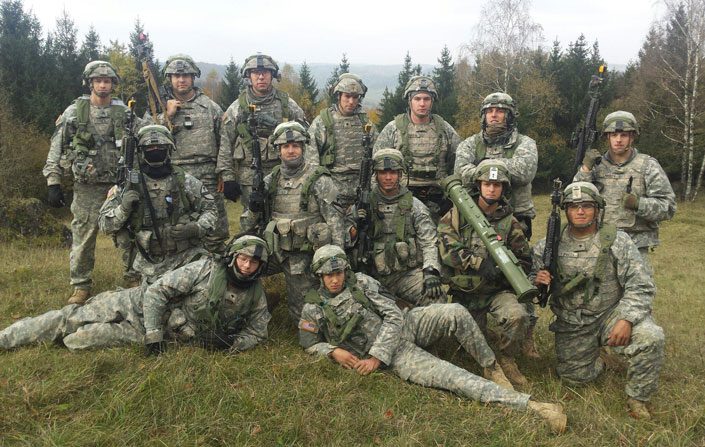Cavalry scout uses intel-gathering skills in Dell tech support

In May 2015, Army Specialist Matt Lang had four months until his term of service ended. With a baby on the way and the future uncertain, he was looking for career options that would provide as much stability and growth potential as possible. The Army offered numerous apprenticeship programs for its soldiers, but for Lang, one stood out above all others: Microsoft Software & Systems Academy (MSSA).
“More than anything, I was looking for a career that would provide for my family over the long term. Microsoft is one of the most successful corporations out there, and the tech industry holds a lot of promise, so I was confident that MSSA would provide the highest probability for success,” Lang recalls.
As a cavalry scout in the Army, Lang had learned how to read maps in pitch-black conditions, grew adept at navigating wilderness with nothing more than a map and compass, and developed stamina through countless 30-mile ruck marches in mountainous terrain. Such training was vital to staying safely concealed behind enemy lines, where he could gather intelligence on enemy activities and communicate it up the chain of command.
Today, Lang is nine months into his new career as an enterprise technical senior analyst at Dell’s Resolution Expert Center in Round Rock, Texas. He provides enterprise customers with the highest form of tech support that Dell offers. Though it may seem counterintuitive, Lang’s current duties are much the same as those he executed as a cavalry scout: gathering information amid difficulties, helping diagnose and solve problems, and passing information along to higher-ups as needed — to engineering teams or Dell executives.
This senior analyst position is known to be extremely stressful, which is why historically Dell has typically tapped internal candidates for the job. Lang is only the third external candidate to be hired in the role — a fact he attributes to his MSSA training and what the Army taught him about staying in control and communicating tactfully during stressful situations.
As part of the 18-week MSSA program, Lang and his colleagues in the seventh Fort Hood cohort received technical training that would prepare them for careers in IT and software development. At the end of the program, those who have successfully completed are guaranteed an interview with Microsoft or one of several MSSA hiring partners.
Lang considers the MSSA training he received to be “phenomenal,” thanks to Khalid Almdallal and other instructors he learned from. Lang describes Almdallal as one of the best instructors he’s had throughout his college experience, which spans all the way back to graphic design classes he took before joining the military.
“The fact that everyone in my cohort passed is largely because of Khalid,” says Lang. “He could tell who was struggling and made sure that everyone had the help they needed to pass. He was strict but set you up for success.”
For Lang, that involved Almdallal coming to the computer lab during the weekends to answer questions, scheduling 1:1s to discuss what was going well and what wasn’t, and helping Lang develop a game plan for finishing MSSA successfully.
As part of its commitment to help former service members find new career paths in the tech industry, MSSA partners with a handful of leading hiring partners. These partners provide individual MSSA cohort members with interview and job placement assistance.
Jobplex partner Patrick Bulmer says that because of their training and experience, military veterans — and MSSA graduates in particular — are much more adaptable to learning new technologies and have a consistently higher level of maturity than most job applicants. For this reason, they are frequently found leading larger teams in corporate roles than is typical for others with the same experience level.
Lang was an especially motivated candidate, Bulmer notes, because of how proactive he was in doing the little things that would differentiate him with employers — things like having a top-notch resume, preparing rigorously for interviews and maintaining a consistent follow-up schedule with potential employers.
Nearly a year later, Lang still stays in contact with Almdallal. And when he’s not solving high-pressure technical support issues, you can typically find him at the park with his family, or at the local gym where he offers his own brand of training — based on his experiences on the battlefield.
